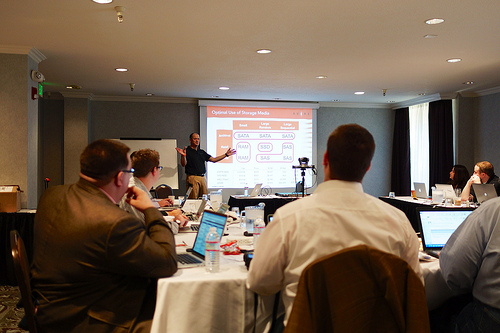We at Foskett Services are deeply involved in the mechanics of corporate and industry social media and PR. It comes with the territory, running Tech Field Day, participating in events, and generally getting involved. And this has made us the target of many “influencer programs”, from Microsoft MVP, VMware vExpert, and EMC Experts to Cisco Champions and many more.
Most of these influencer programs get some things right and other aspects laughably wrong. Rather than pick on any one, let’s set up a straw man to point out the biggest sins of corporate influencer programs, as we see it.

Introducing the Simplex Sycophant Society
Let’s imagine a company, Simplex Networks, that wanted better to reach out to social media influencers and a crack team of Social Media Expert Consultants convinced them to start an influencer appreciation marketing program. The Simplex Sycophant Society is integrated with the core message of Simplex Networks and functions to externalize marketecture and message management for MBO and KPI acceleration. Or something.
But the poor folks at Simplex have hired the wrong team to manage their program and they’re making some huge mistakes! Let’s dive into their poor decisions.
“We’ll Draw From Our Biggest Supporters!”
Jim and Jon and Jane are always writing and speaking about Simplex. They love their doodads and never miss an opportunity to praise the company. They’re shoo-ins for the Sycophant Society.
But it’s a huge mistake to draw only from “champions” you know and appreciate! The most credible voices are those who are willing both to praise and criticize fairly and deservedly. It can be uncomfortable to see a negative review, but those can be even more important to a company than endless commendation. These programs should educate insiders as well as would-be customers.
It’s also important to reach for unfamiliar voices. We too often believe that the people we know are the entirety of the world, but this is a huge mistake in the segmented world of blogs, podcasts, forums, seminars, and events. Look first for people you don’t know rather than those you do.
“We’re Recognizing our Amplifying Army!”
Simplex pitched their program to bloggers as recognition for hard work but that’s not how they sold it internally. Their Social Media Consultants focused on messaging, amplification, and influencing the “experts” and “MVP’s”!
Be clear on the purpose of the program, both internally and externally. If the program is totally self-serving, you will end up alienating the very people with whom you’re trying to connect! Are you getting the balance right between recognition and influence? Do your “champions” feel valued or put upon once they’re part of the program? How much homework do they have to do to maintain their “award”?
It’s a good idea to set a limit on the size and makeup of the Influencer Army, too. Do you allow partners and employees to join? Why or why not? What are the criteria for inclusion and how will you remove people fairly? These things can quickly get out of hand!
“We’ve Media-Trained Official Internal Interactors!”
The Simplex PR team was very sensitive about opening up so they only allowed a special team of media-trained spokespeople to interact with their program. They were scared that independent writers and speakers might go off message, and there’s no way to go over their heads if they start saying uncomfortable things.
But media-trained spokespeople are boring, and on-message-only chats are unlikely to inspire coverage. The Internet of carefully-crafted marketing has trained us all to cut through the BS with a vorpal blade of wit and cynicism. Slick spokespeople are a relic of “a more civilized age” when writers played the game too.
It’s especially disappointing to see fantastic, credible individuals inside these companies overlooked and stymied in their attempts to reach out to their peers. Look around and you’ll see that the best spokespeople are already speaking and would do a much better job than Mr. Slick if only they were given the support!
“Let’s Have Our Sycophants Push This Out For Us!”
The pitch to Simplex Networks was to use their Sycophant Society simply as another vehicle for one-way marketing communication. So they put together weekly lists of suggested tweets, monthly product-specific writing assignments, and annual production quotas. Then they were surprised that their “champions” started falling out.
What was the point of this program again? It comes back to balance of benefit between the company and it’s champions. It’s ok to ask influencers to share your message but be very careful with this. They’re not just a corporate mouthpiece and you can quickly overstep their bounds of independence. The truly worthwhile will fall out of the program and you’ll be left with the shills. Is that what you wanted from the program?
Some try to overcome this resistance with rewards, from free product to cold, hard cash. But this too can backfire if it looks excessive or goes undisclosed in alleged independent content. Work for balance before all else and you won’t have to bribe your influencers.
“We’re Making That an Official Component of the Sycophant Society!”
Simplex saw people come up with all sorts of cool ideas, from social sharing concepts to in-person fun at their events. So they decided to bring these under the “official” Sycophant Society umbrella. Then everything fell apart because it just wasn’t fun anymore.
Companies should be wary of glomming onto erstwhile spontaneous activities and corporatizing them. Enjoy what your influencers do. Support them as needed. But allow them to thrive on their own rather than smothering them!
One additional benefit of keeping activities at arm’s length is deniability: If something negative does arise, it’s good to be involved but not committed to a publication or a party. You can benefit from the honest feedback without being on the hook for it.
“We’ll Invite the Sycophants to our Simplex Day!”
Since they already had an annual analyst and press event, Simplex decided to allow their Sycophants to tag along. But why were they ignoring the financial overview? And what about that golf outing they skipped? Plus, quite a few just couldn’t get time off work.
One reason we started Tech Field Day was the proliferation of events throughout the year. There’s something to go to somewhere just about every week, and multiple things some weeks! Yet independents must be choosy, selecting just a few events to attend out of the yearlong schedule. Even if their company is enlightened enough not to require vacation days for events, there’s an inevitable push-back to be had when requesting time off a dozen times a year.
Moreover, analyst and press days are usually inappropriate for independent techies. There’s too much filler and not enough deep interaction to justify a three-day trip for every company. And we also get back to the “inappropriate influence” factor when you add in golf or ski outings, giveaways, and luxury accommodations.
Rather than just bringing your influencers to your existing analyst and press events, why not set up a special event just for them? Time it to coincide with another industry event to minimize time off, or just join an existing event.
Suggested Tweets
So there you have it: Six things influencer programs too often get wrong. Don’t by like the Simplex Sycophant Society. Get the balance right.
Disclaimer: Did we mention we have many horses in this race? We run Tech Field Day, help with the SolarWinds thwack Ambassador Program and the Aruba Ambassador Program, and assist with outreach for other companies besides. Our primary goal with these efforts is balance between the objectives of the companies and the independent writers and speakers we work with. That’s kind of what this post is all about!

